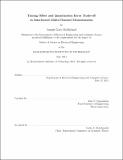Timing offset and quantization error trade-off in interleaved multi-channel measurements
Author(s)
McMichael, Joseph Gary
DownloadFull printable version (6.468Mb)
Other Contributors
Massachusetts Institute of Technology. Dept. of Electrical Engineering and Computer Science.
Advisor
Alan V. Oppenheim.
Terms of use
Metadata
Show full item recordAbstract
Time-interleaved analog-to-digital converters (ADCs) are traditionally designed with equal quantization granularity in each channel and uniform sampling offsets. Recent work suggests that it is often possible to achieve a better signal-to-quantization noise ratio (SQNR) with different quantization granularity in each channel, non-uniform sampling, and appropriate reconstruction filtering. This thesis develops a framework for optimal design of non-uniform sampling constellations to maximize SQNR in time-interleaved ADCs. The first portion of this thesis investigates discrepancies between the additive noise model and uniform quantizers. A simulation is implemented for the multi-channel measurement and reconstruction system. The simulation reveals a key inconsistency in the environment of time-interleaved ADCs: cross-channel quantization error correlation. Statistical analysis is presented to characterize error correlation between quantizers with different granularities. A novel ADC architecture is developed based on weighted least squares (WLS) to exploit this correlation, with particular application for time-interleaved ADCs. A "correlated noise model" is proposed that incorporates error correlation between channels. The proposed model is shown to perform significantly better than the traditional additive noise model for channels in close proximity. The second portion of this thesis focuses on optimizing channel configurations in time-interleaved ADCs. Analytical and numerical optimization techniques are presented that rely on the additive noise model for determining non-uniform sampling constellations that maximize SQNR. Optimal constellations for critically sampled systems are always uniform, while solution sets for oversampled systems are larger. Systems with diverse bit allocations often exhibit "clusters" of low-precision channels in close proximity. Genetic optimization is shown to be effective for quickly and accurately determining optimal timing constellations in systems with many channels. Finally, a framework for efficient design of optimal channel configurations is formulated that incorporates statistical analysis of cross-channel quantization error correlation and solutions based on the additive noise model. For homogeneous bit allocations, the framework proposes timing offset corrections to avoid performance degradation from the optimal scenario predicted by the additive noise model. For diverse bit allocations, the framework proposes timing corrections and a "unification" of low-precision quantizers in close proximity. This technique results in significant improvements in performance above the previously known optimal additive noise model solution.
Description
Thesis (S.M.)--Massachusetts Institute of Technology, Dept. of Electrical Engineering and Computer Science, 2011. Cataloged from PDF version of thesis. Includes bibliographical references (p. 117-118).
Date issued
2011Department
Massachusetts Institute of Technology. Department of Electrical Engineering and Computer SciencePublisher
Massachusetts Institute of Technology
Keywords
Electrical Engineering and Computer Science.